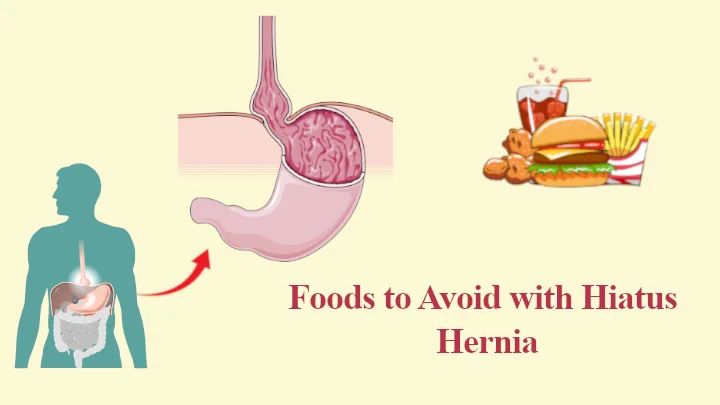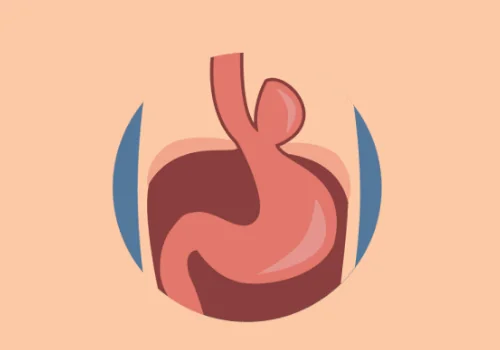11 Hiatal Hernia Foods to Avoid: Foods that irritate Hiatal Hernia

Looking for hiatal hernia foods to avoid? Dietary choices can significantly contribute to symptom management and general well-being when dealing with a hiatal hernia. When a part of the stomach pushes through the diaphragm and into the chest cavity, it causes a hiatal hernia, which causes discomfort and digestive problems. Even though medical attention might be required, changing one’s diet can help reduce symptoms and prevent aggravation.
Particularly, certain foods should be avoided by those with a hiatal hernia since they can increase discomfort and cause heartburn and acid reflux.
In this post, we’ll look at Hiatal hernia foods to avoid. We’ll explain how these foods may affect the disease and suggest other options for a more pleasant and healthy lifestyle.
In This Article
- Foods that Irritate Hiatal Hernia
- Hiatal Hernia Foods to Avoid
- Cold food irritates hiatal hernia
- Do certain foods irritate a hiatal hernia
Foods that Irritate Hiatal Hernia

When a portion of the stomach slips through the diaphragm and into the chest cavity, it develops a hiatal hernia. Symptoms of this illness include heartburn, acid reflux, and discomfort. A hiatal hernia might aggravate some foods, making these symptoms worse.
High-acid foods like citrus fruits and tomatoes can cause heartburn and worsen acid reflux. Curry and other hot, spicy foods can irritate the esophagus and cause discomfort. Carbonated drinks, such as soda and fizzy drinks, can irritate the stomach and lead to bloating, aggravating symptoms.
Hiatal Hernia Foods to Avoid
Here we have described What foods to avoid when you have a hernia:
1. Carbonated beverages
Soft drinks should be avoided for those with hiatal hernias because they can increase pressure on the stomach and lead to symptoms such as bloating and discomfort.
2. Citrus fruits
Citrus fruit like oranges, lemons, grapefruits, and limes are very acidic. Consumption of acidic foods can trigger heartburn and increase the risk of acid reflux, worsening the symptoms associated with hiatal hernia.
3. Spicy foods
Spicy foods can irritate hiatal hernia. Spicy foods can increase the production of stomach acid, especially those that contain chilli powder, spicy peppers, or spices like cayenne or paprika. Heartburn and reflux, frequent signs of a hiatal hernia, can be worsened by too much stomach acid.
4. Alcohol Consumption
In conditions with hiatal hernia, alcohol should be avoided for several reasons. Second, drinking alcohol increases the production of stomach acid, worsening reflux symptoms even more.
Finally, drinking alcohol can cause dehydration and worsening digestive issues. It is advised to limit or completely avoid alcohol consumption to control hiatal hernia.
5. Fried and fatty foods
Fried or fatty foods should be avoided if you have a hiatal hernia since they can worsen your symptoms and cause acid reflux. Due to the slower rate of digestion caused by specific foods, there is a greater chance of esophageal reflux disease.
Fried and fatty foods have a high-fat content that takes longer to digest, causing the stomach to feel fuller for longer periods and putting strain on the hernia.
6. Garlic and Onions
Garlic and onions are frequently avoided in cases of hiatal hernia because they can potentially worsen reflux symptoms and cause heartburn. In addition to having a strong flavour and the potential to cause bloating and burping, onions and garlic may worsen symptoms.
7. Caffeinated beverages
Caffeinated foods to avoid when you have a hiatal hernia. Caffeine can relax the lower esophageal sphincter (LES), the muscle that prevents stomach acid from leaking back into the esophagus, and encourage the formation of stomach acid.
Hiatal hernia symptoms might worsen when the LES is relaxed since it raises the risk of acid reflux and heartburn.
8. High-fat desserts
High-fat desserts are often calorie-dense, which can contribute to weight gain. Excess weight can put additional pressure on the stomach and worsen symptoms of hiatal hernia.
9. Greasy foods
Greasy foods to avoid hiatal hernia pain because they can exacerbate symptoms and increase the risk of acid reflux. Greasy foods may cause digestive tract irritation, which exacerbates hiatal hernia symptoms.
10. Tomatoes and Tomato-based products
Since tomatoes and products containing tomatoes are quite acidic, those with hiatal hernia should avoid them. The esophageal lining of tomatoes can become irritated and cause symptoms like reflux and heartburn.
11. Mint and peppermint
Mint and peppermint should not be consumed if you have a hiatal hernia because they can relax the lower esophageal sphincter, which prevents stomach contents from returning to the esophagus.
Q. Does cold food irritates hiatal hernia?
Ans- Cold foods themselves do not directly irritate a hiatal hernia. However, certain cold foods may contribute to symptoms. Cold beverages, especially carbonated ones, can cause bloating and increase pressure on the stomach, potentially exacerbating discomfort.
Q. Do certain foods irritate a hiatal hernia?
Ans- Yes, some foods may worsen a hiatal hernia and worsen its symptoms. These foods often increase the formation of stomach acid, relax the lower esophageal sphincter, or cause bloating and gas, all of which can worsen the pain caused by a hiatal hernia.
Conclusion
In conclusion, it is advised to avoid particular foods if you have a hiatal hernia because they may aggravate the problem and worsen your symptoms. Pay attention to your body’s reaction and work with your physician or registered dietitian to create a customized food plan that meets your unique needs and reduces symptoms.
Read Next
References
- The management of hiatal hernia: an update on diagnosis
- Clinical Significance of Hiatal Hernia
- Approaches to the Diagnosis and Grading of Hiatal Hernia





